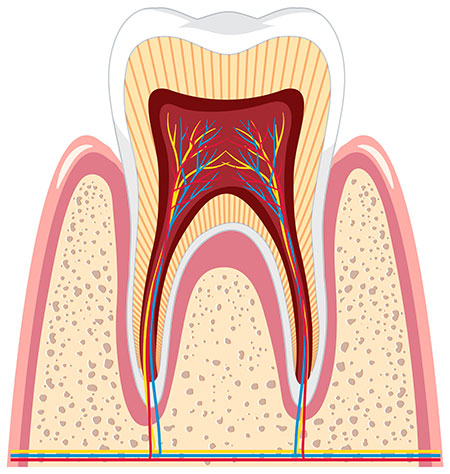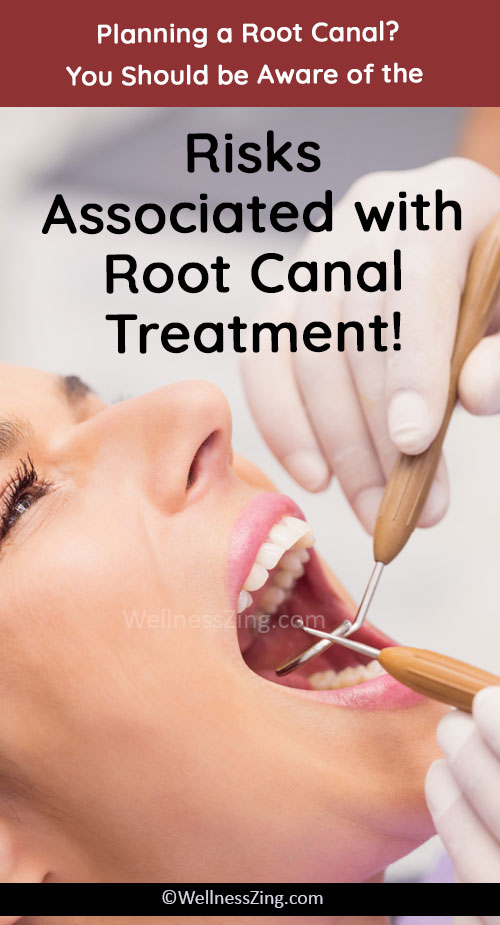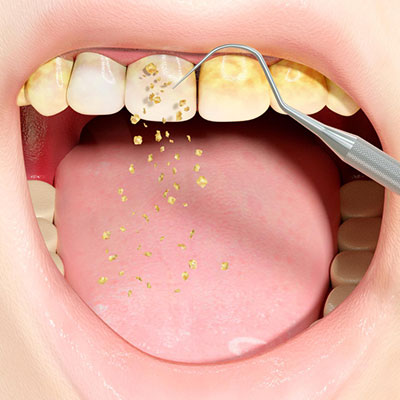Root canal is a common type of dental treatment. Though it looks harmless, it can take your health at a toss in several unimaginable ways. Can’t believe? It is true. Continue reading this post to find out more about Root Canal, its adverse impact, and ways to protect your body from it.
What is a Root Canal?
Root canal is also called endodontic therapy. It is a dental treatment designed to prevent a badly decayed tooth from becoming infected. The treatment focuses on eradicating any existing infection and safeguarding the tooth from any consequent infections.
“Root canal” describes the natural cavity present in the midregion of the tooth. The pulp chamber is identified as the soft region present within the canal. The nerve of the tooth is located within the root canal.
This nerve is not very significant to the health of the tooth. It begins to function only when the tooth develops through the gums. The only function of this nerve is to provide the hot and cold sensations to the person. The absence of this nerve will not impact the daily operation of the tooth.
With the root canal procedure, the infected pulp and nerve present in the root canal get replaced by an inert material. The inner surface of the tooth is properly cleaned and closed. Without this treatment, the tissue that surrounds the tooth also gets infected and may give rise to the formation of an abscess.
What Is The Requirement For Removal Of The Tooth Pulp?
When the nerve or the pulp of the tooth gets damaged, then it starts to disintegrate. This causes the bacteria to multiply in large numbers in the pulp chamber. Decayed debris, along with the bacteria, results in an abscess in the tooth.
It is seen as the formation of pus at the ends of the origin of the tooth. The bacterial infection spreads throughout the root of the tooth. This infection is dangerous and needs to be treated soon. It causes following discomforts to a person.
- Swelling spreads to other regions of the face, head, and neck
- Loss in bone density happens around the origin of the tooth
- Drainage issues start to extend in the outward direction from the root. It can also result in the formation of a hole either through the cheek into the skin or through the side of the tooth into the gums.
What is the reason behind the controversy over the Root Canal?
Root canals have been a highly debated topic throughout the dental world. When asked dentists about its safety, a majority of them have a favorable opinion about this procedure. According to them, it is a safe dental procedure that helps in the effective treatment of deep-seated dental cavities.
The results obtained from the research on root canals uncover some hidden insights and not so appealing facts about the treatment. It has been found that the treatment enables the growth of harmful bacteria in the mouth as well as in the remaining body regions.
Complications of Root Canal Procedure
Root canals are advised for such types of dental cavities that have advanced into the origin of the teeth. The treatment removes the infected pulp from the teeth and cleans it before filling the space in the tooth with the dental filling materials. This treatment replaces the living tissues present in the infected tooth. It doesn’t require a patient to remove the tooth. However, the infected tooth is considered a dead tooth that doesn’t perform any function.
Despite the best efforts by the dentist to efficiently seal and clean the tooth, there is a possibility that new infections might emerge after performing a root canal. Below are the reasons why it can happen:
- An unidentified crack in the source of a tooth: An improper or defective dental restoration that permits bacteria to spread throughout the tooth and again contaminate that area
- A cessation of the inside sealing material with passing time that permits bacteria to again infect the tooth
- Embed Asset Becomes Predominant: There are innumerable root canals that can get infected. There is a possibility that a few of those still remained uncleaned in this procedure.
How safe is a root canal procedure?
According to the study performed to verify the efficiency of root canal treatment, the presence of the pathogenic bacteria and endotoxins was found in almost all root canals. The cleaning procedures like Root Canal were only able to eliminate 44% of such bacteria, but the remaining bacteria will still be present after the treatment.
The theory led to long-term health issues in people that include:
- Infection in the interior and exterior of the root canal
- Extruded dental filling that led to an immune response
- Deposits of cholesterol minerals that cause irritation in the dental tissues
- Cystic lesion at the place where the root canal is performed
- Formation of scars in dental tissues at the root canal site
After the root canal treatment is done, there are high chances that infection-causing bacteria still remain at the site. This can result in infections and other complications. A person may be required to take antibiotics to prevent the spreading of infection. However, these antibiotics present their own share of adverse impacts on the body. Also, there is no scientific backing that confirms that antibiotics aid in the complete elimination of root canal infections.
Meanwhile, here is a guide on removing plaque and tartar from your teeth using natural home remedies.
What problems are caused by lingering bacteria?
The bacteria present in almost all root canals have the potential to stimulate inflammatory molecules like TNF-alpha and Interleukin-1 beta. They increase inflammation in the body. In a few acute cases, it can even lead to the development of fever, abscess, cellulitis, or malaise in the neck as well as the head region.
In some scenarios, the condition can become so severe that the person even needs to get admitted to a hospital. The bacteria present in the root canal teeth produce and has the ability to even compromise a healthy immune system.
These bacteria produce powerful toxins like botulinum (a widely identified, strongest toxic substance). The combination of bacterial inflammation and toxins results in the development of various types of health issues.
What does the research show about the impact of Root Canal?
There are various studies performed by dentists in the past that come to the result that root canals cause severe inflammation in a person.
To arrive at this conclusion, a series of experiments were performed on rabbits. Researchers have extracted root canal teeth from people suffering from varied health issues and implanted them on the rabbit. It was found that the rabbit also developed the health issue that the person with that tooth had.
This showed that when a root canal tooth from a person who has been suffering from issues like heart attacks, arthritis, etc. has been implanted on a rabbit, it too developed those diseases in a short span of just a few weeks.
As the bacteria exhibit a transmissible nature, they can transmit the same health issues from humans to rabbits via tooth transplantation. This confirms that the periodontal infections caused by these bacteria are associated with severe inflammatory ailments.
Some of the commonly found bacteria in the root canal were Fusobacterium, Prevotella, Parvimonas, Dialister, Porphyromonas, Treponema, and Streptococcus. The problem arose when these bacteria got infected and raised in the root canal. The anaerobic conditions in the root canal make these bacteria dangerous. With respect to periodontal infections, these bacteria can cause several acute inflammatory ailments:
- The bacteria Porphyromonas, Treponema, and Fusobacterium can cause atherosclerosis.
- The bacteria Porphyromonas can cause inflammation and result in Alzheimer’s disease.
- Porphyromonas, Tannerella, and Treponema can reduce the body’s ability to control blood glucose levels and can lead to diabetes.
What should a person do to prevent the root canal side effects?
After learning about the dangerous impact of Root Canal on the body, it is advised to avoid getting this treatment at all costs. It is better to lose a tooth than to risk yourself of long-term inflammation and various other health issues.
There are a few safer alternatives available, but they may also pose you with some challenges. The best available option is to maintain the right level of oral hygiene and oral health as much as you can.
Here are a few alternatives to Root Canal Treatment
Bacterial infection in deep dental cavities can be dangerous and can infect the jaw at deeper levels. The more you wait, the more severe the problem will become. The best measure would be to remove the infected tooth with the periodontal ligament to prevent any further infections.
Here, in this case, you won’t suffer from the spreading of bacterial infections as in root canal treatment, but you will no longer have that tooth. Following are some of the surgical dental procedures for the extraction of an infected tooth.
1. Dental Implants
In this procedure, the tooth along with its cavity is removed. It is replaced by a metal implant. One of the drawbacks of this procedure is that the metal implantation can increase the level of metals within the body, which can result in an immune response.
2. Dental Bridge
This is a safer alternative compared to a dental implant, as the method of metal implantation into the gums doesn’t cause any complications. A dental bridge fills the gap that is created after extraction of the infected tooth. This bridge consists of specially designed and customized two or more dental crowns that are fitted on the anchoring teeth.
3. Partial Denture
In this method, a removable denture is used for the replacement of the extracted tooth. Due to its temporary nature and less comfort, it is less costly than the above two. In terms of safety, partial dentures are viewed as the least invasive dental procedure available.
In the scenario, when your tooth has advanced to a level where there is no other alternative left than undergoing a root canal (provided that you don’t want to lose your tooth), then your only way is to get the root canal procedure done.
Root Canal Prevention
Prevention is better than cure. Here are the two main things that you need to do to prevent the need for a root canal in your life.
1. Maintain good oral hygiene
Some of the reasons for the pulp and nerve of the tooth to get infected and inflamed are due to deep decay. Dental treatments on that tooth, large fillings, maintaining good oral hygiene (brushing your teeth twice daily, flossing your mouth once daily, and regular dental checkups) may lessen the requirement for a root canal treatment.
2. Adjust Lifestyle Choices
Adopting a specific lifestyle can help in avoiding or eliminating the need for performing a root canal. Some of these lifestyle practices are:
- Eat a low-inflammatory diet
- Maintain good gut health
- Manage stress
- Use plant-based extract that includes Aloe Vera, eucalyptus, and rosemary. They have antimicrobial properties to kill bacteria that infect the root canal as well as the teeth.
Conclusion
Root canals are a tough subject. Due to the adverse impact it causes on the health of the person, it is not a completely safe treatment to consider. The best scenario is to keep good oral health, explore your available options, and avoid the need for this controversial dental procedure. People who have no other option than to go for a dental operation should find a reliable dentist to perform this procedure to ensure the safest level of its operation.
I hope you liked this article. Please share it with your family and friends on social media. If you have any queries, then do write to us. We would be happy to solve them at the earliest.





